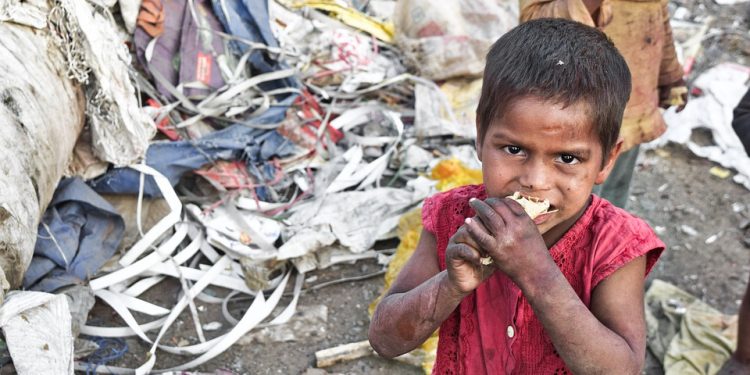New Delhi: India has slipped to 102 position in the Global Hunger Index 2019 of 117 countries, slipping from its 2018 position of 95 and behind its neighbours Nepal, Pakistan and Bangladesh.
Seventeen countries, including Belarus, Ukraine, Turkey, Cuba and Kuwait, shared the top rank with GHI scores of less than five, the website of the Global Hunger Index that tracks hunger and malnutrition said Wednesday.
The report, prepared jointly by Irish aid agency Concern Worldwide and German organisation Welt Hunger Hilfe termed the level of hunger in India “serious”.
In 2000, India was ranked 83 out of 113 countries. Now, with 117 countries in the fray, it has dropped to 102 rank.
Its GHI score has also decelerated — from 38.9 in 2005 to 32 in 2010 and then from 32 to 30.3 between 2010 and 2019.
The GHI score is calculated on four indicators — undernourishment; child wasting, the share of children under the age of five who are wasted (that is, who have low weight for their height, reflecting acute undernutrition); child stunting, children under the age of five who have low height for their age, reflecting chronic undernutrition; and child mortality, the mortality rate of children under the age of five.
The share of wasting among children in India rose from 16.5 per cent in the 2008-2012 period to 20.8 per cent in 2014-2018, according to the report.
Just 9.6 per cent of all children between 6 and 23 months of age are fed a “minimum acceptable diet”, it said.
“India’s child wasting rate is extremely high at 20.8 per cent, the highest for any country in this report,” it said.
Countries like Yemen and Djibouti, which are conflict ridden and facing severe climate issues respectively, fared better than India on that front, according to the report.
Neighbouring countries like Nepal (73), Sri Lanka (66), Bangladesh (88), Myanmar (69) and Pakistan (94) are also in the ‘serious’ hunger category, but have fared better at feeding its citizens than India, according to the report.
China (25) has moved to a ‘low’ severity category and Sri Lanka is in the ‘moderate’ severity category.
However, India has shown improvement in other indicators such as the under-5 mortality rate, prevalence of stunting among children and prevalence of undernourishment owing to inadequate food, the report said.
The report also mentions the central government’s Swachh Bharat programme, saying open defecation is still being practised.
“Even with new latrine construction, however, open defecation is still practised. This situation jeopardises the population’s health and consequently, children’s growth and development as their ability to absorb nutrients is compromised,” the report said.
PTI







































